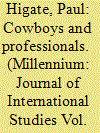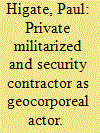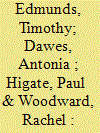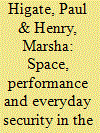|
|
|
Sort Order |
|
|
|
Items / Page
|
|
|
|
|
|
|
| Srl | Item |
| 1 |
ID:
110915


|
|
|
|
|
| Publication |
2012.
|
| Summary/Abstract |
This article examines the politics of identity work in the private security industry. Drawing on memoirs authored by British private military contractors, and using a theoretical framework influenced by symbolic interactionist thought, the article highlights the relevance of intersubjectivity to identity constitution. In particular, British contractors are found to constitute their professional identity in relation to their US military and contractor counterparts, above all by framing them as 'less-competent others'. This article makes an original contribution to the private and military security companies literature through its sociological focus on the links between national and professional self-identities and security practices on the ground. The article also explores the importance of the memoir genre as a valid textual resource which throws light on the interplay of the international and security dimensions within multinational military and militarised contexts.
|
|
|
|
|
|
|
|
|
|
|
|
|
|
|
|
| 2 |
ID:
058804


|
|
|
| 3 |
ID:
092126


|
|
|
|
|
| Publication |
2009.
|
| Summary/Abstract |
Despite a growth in social studies of peacekeeping, there has been little written on field experiences in such contexts. This article examines the role of the researcher in influencing the research process and product in two peacekeeping sites, Liberia and Kosovo. Although researchers are often positioned in powerful ways vis--vis researchees, the multiplicity and complexity of their positionality are often overlooked. By drawing on examples from team research conducted, the article suggests that these positionings give rise to unconventional and contradictory power relations. By reflecting on the role of the researcher(s) and the politics of research itself, we hope to engender more conscientious peacekeeping research.
|
|
|
|
|
|
|
|
|
|
|
|
|
|
|
|
| 4 |
ID:
130910


|
|
|
|
|
| Publication |
2012.
|
| Summary/Abstract |
As a consequence of the ontological and epistemological traditions dominating the private military and security company literature to date, the embodied dimensions of the industry have been overlooked. The current article addresses this lacuna through a phenomenological focus on the links between military corporeal conditioning, possibilities for the industry's emergence, and the impact of contractors on security. I develop the concept of geocorporeality to make explicit the geopolitical relevance of security contractors' military trained bodies. The article concludes by drawing out the implications of this embodied line of enquiry for questions of contractor accountability and agent intentionality.
|
|
|
|
|
|
|
|
|
|
|
|
|
|
|
|
| 5 |
ID:
144727


|
|
|
|
|
| Summary/Abstract |
In recent years, there has been a sharp growth in political and sociological interest in the British military. Set against the backdrop of the armed forces’ increasing presence in everyday life, alongside the organizations’ ongoing restructuring, the current paper focuses on the MoD’s problematic attempts to recruit 30,000 reservists by 2020; what has become known as the Future Reserves 2020 programme (FR2020). We argue that these changes are driven in part by the need to cut costs in defence. However, we also suggest that they are a reflection of the changing nature of modern military organisation, and the manner in which armed forces engage with the societies of which they are a part, and with the citizens that make up that society. We locate FR2020 programme in the context of a wider narrative about the changing nature of military organisation in contemporary western democracies, identifying structural, circumstantial and normative reasons for change. We also examine the specific challenges of implementing FR2020 in practice, including issues of recruitment and retention, integration and support, and relations with families and employers, drawing on the experience of comparator countries to do so. We conclude by considering the implications of these changes, both for the future of UK armed forces, and for the evolving nature of military-society relations in Britain.
|
|
|
|
|
|
|
|
|
|
|
|
|
|
|
|
| 6 |
ID:
093882


|
|
|
|
|
| Publication |
2010.
|
| Summary/Abstract |
Studies of peacekeeping have helped to reveal the complexities, dilemmas and challenges of operations since their inception, and almost certainly into the future. Yet, despite the empirical and theoretical breadth of this canon, the field continues to be dominated by political science, development studies, international law and military studies, whose scholars tend to draw on 'problem-solving', macro-level and positivist perspectives in their writings. The impact of post-structural and post-positivist epistemologies developed in sociology, human geography and cultural studies remain marginal in the field. Given this, the present article seeks to complement and develop the study of peacekeeping through its framing of blue-helmet activity as embodied, spatial-security practice that is performed 'out front' for the 'beneficiary' audience. In so doing we draw on critical geopolitics, military/human geography and sociological theorizing with a focus on space and performance. Our main aim is to show how the concepts of space and performance can be used to illuminate perceptions of everyday security by recourse to a modest, illustrative empirical component based on fieldwork in Haiti, Kosovo and Liberia.
|
|
|
|
|
|
|
|
|
|
|
|
|
|
|
|
|
|
|
|
|